Black Grills: Homage to the Asian Tradition of Blackened Teeth, Once a Mark of High Status
Courtesy of @sailorr Sailorr and Molly Santana’s black grills fuse hip-hop swagger ...
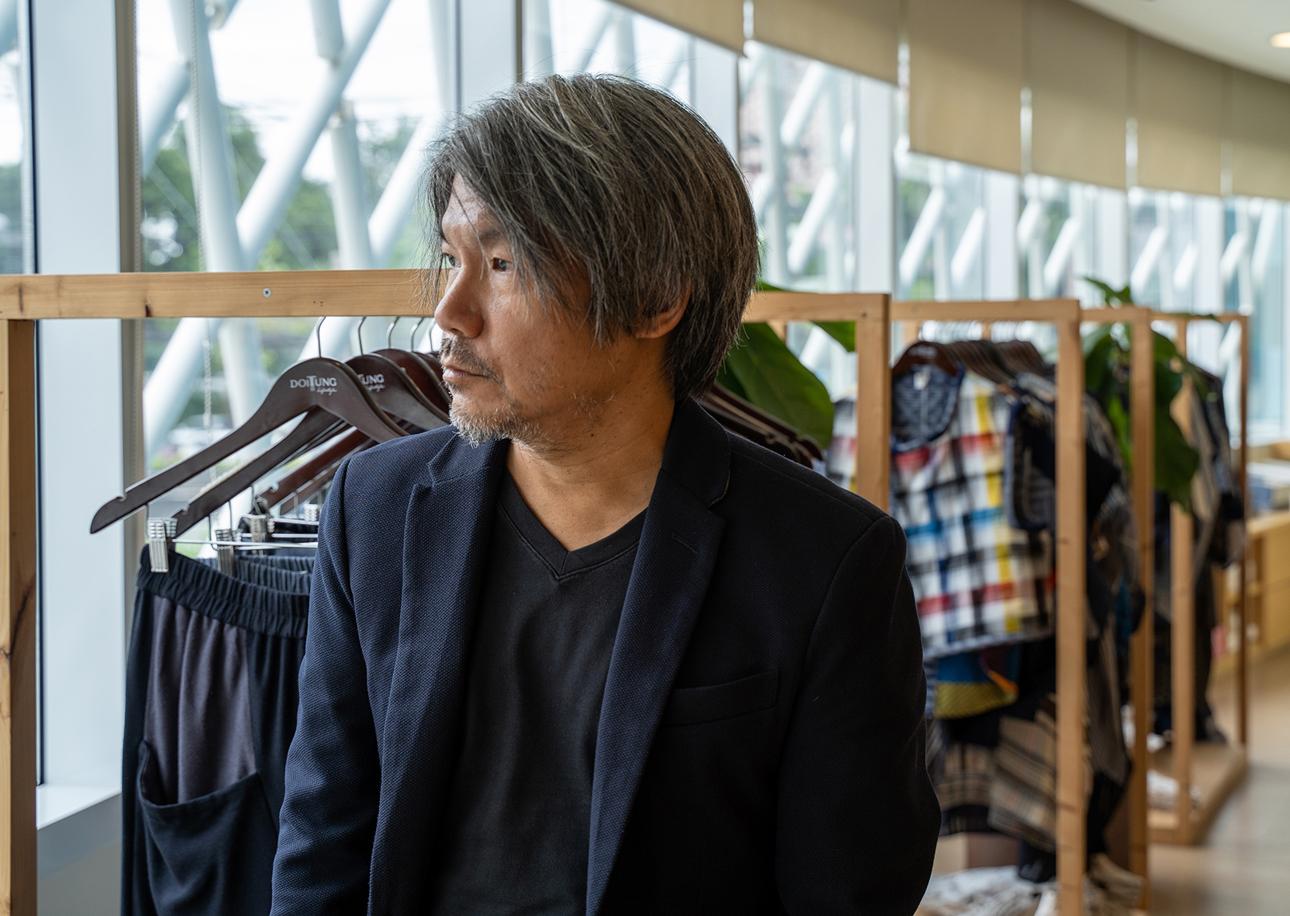
Fashion is usually predicated on seasonal trends but it doesn’t necessarily have to be a passing look that you discard at the end of the year. Today, more than ever, fashion houses are doing their part to become sustainable.
Dr Kris Yensudchai, creative director of the Mae Fah Luang Foundation, is in charge of its DoiTung fashion brand and at the forefront of taking its apparel to the next level. Not only has he introduced innovative designs and upcycled materials to the brand’s handwoven textile lines, he is also attempting to elevate it to a fully-fledged circular economy.
The man himself says his interest in fashion was sparked early, based on a childhood penchant for quality brand name products. The son of a physician, he admits his parents indulged him to a certain extent, harbouring hopes that he would one day become a doctor or an engineer. He in turn indulged them by focusing on the sciences in school (earning an “F” in art). He then veered towards architecture, interior design in particular, as a form of compromise that allowed him an outlet for his passion for design, studying the discipline in San Diego. Outstanding and prolific even then, he was already exhibiting his work at the age of 22.
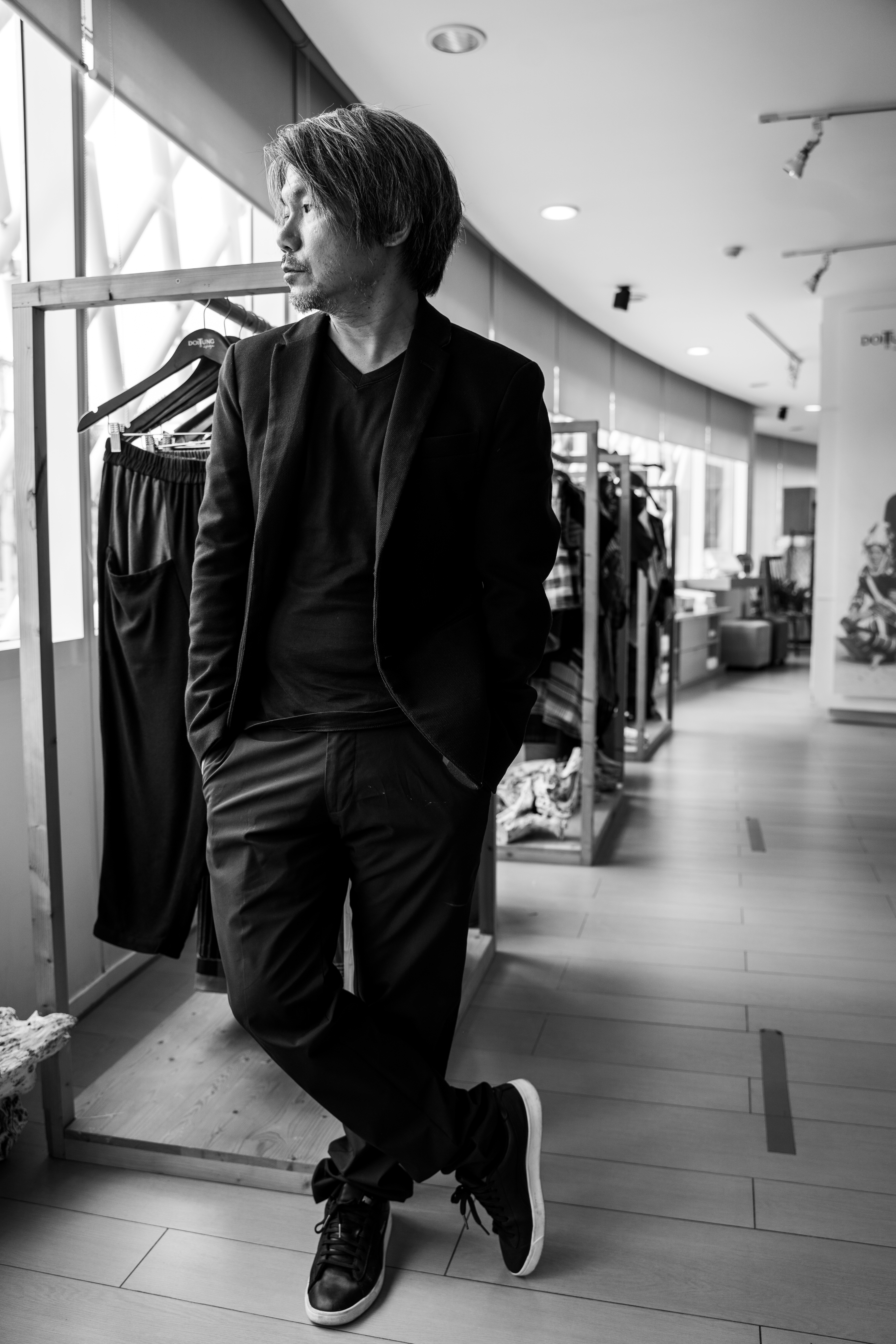
However, Kris admits he was also living something of a frivolous lifestyle, until he reached a point when he felt the need for self-transformation to create a sense of worth. The switch from interior design to fashion was organic. A certain sensitivity towards the human condition made him see clothing as a second skin and as the Tom Yum Kung economic meltdown hit in the late 1990s and overseas students were being called back due to the depreciation of the Thai baht, he instead bucked the trend and headed off to the Istituto Marangoni in Milan. There, he experienced the thralls of being a newbie in an alien environment for all sorts of reasons, not least the language, the field of studies and the switch from American design philosophies to European, which were polar opposites. But what spoke to him was the Italian emphasis on materials as the heart of the design concept, rather than function and commercial value, which he had been taught to lead with before.
“I think studying in Italy suited my personal style,” he explains. “Students of Saint Martins in the UK, for example, are taught to conduct intensive research in order to come up with a concept and then find materials to fit that concept. The Italians, on the other hand, stress the quality of materials first and foremost. To get quality leather you need to raise cows in such a way that their hides are perfectly unmarked. With perfect leather, you can make beautiful products that do not have to rely on extensive design. That’s why the UK and Italy have such a great fashion relationship; Alexander McQueen comes up with great ideas and Italy is ready to supply the right materials.”
Upon returning to Bangkok in 2001, he chanced upon a display of DoiTung attire at Siam Discovery Center, on show as part of Bangkok Fashion Week. Immediately he saw right through to its heart and something clicked. He was thrilled by the infusion of old and new, innovation and craftsmanship, the use of traditional Thai textiles in a truly contemporary way, and he knew this was what he wanted to do.
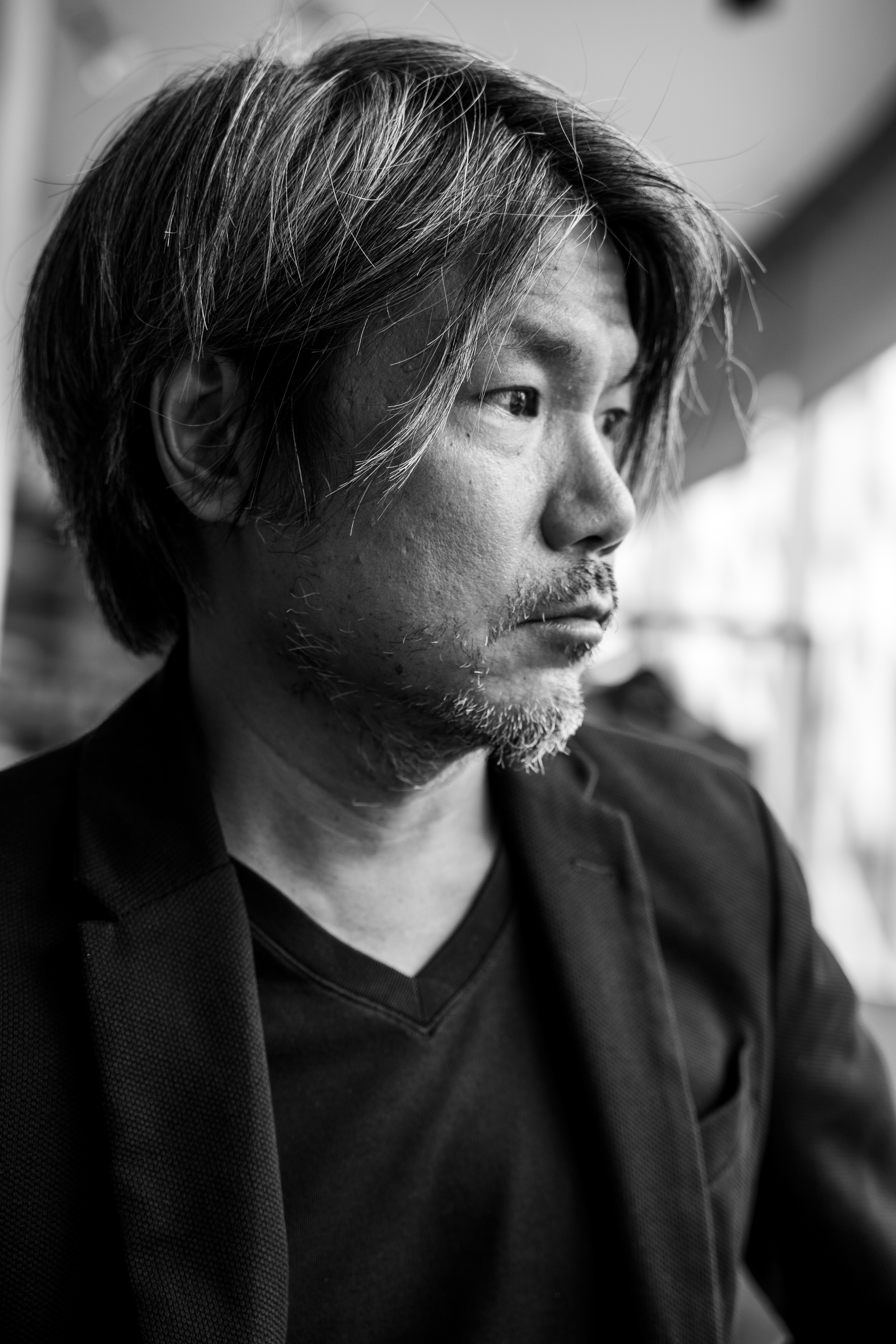
Kris joined the Mae Fah Luang Foundation in 2003, infusing not only his innovative designs into traditional handwoven textiles—which were the focus of DoiTung’s social enterprise—but also pushing the brand into the high-end fashion segment in both local and overseas markets. At the foundation, which is under royal patronage, he was in his element: the beautifully fashioned textiles gave him the perfect platform to work with. “It’s like writing a song,” he explains by way of comparison. “Sometimes the lyrics come first, sometimes the music comes before the lyrics. For me, it’s materials first. Actually, the two evolve at a similar pace with the materials running a little ahead in terms of development.”
Because he didn’t study textiles per se, Kris is happy to be supported by a tight team capable of interpreting his ideas swiftly, using quality equipment to transition his concepts to reality. “It’s as if the foundation gave me a Ferrari to drive,” he laughs. “You just put your hands on the wheel and the machine purrs into harmonious action!” He was also able to experiment with different design concepts and techniques, which the team would try and produce. “One piece might be exactly as I conceptualised it, while another might miss the mark but have merits that can be built on for other products in the future. Mistakes are never mistakes, they are opportunities for development. And this has become my working formula at the foundation. It’s a partnership. Sometimes I throw crazy ideas at the team: I might like the look of some industrial textiles and I want the same effect from a handloom. Instead of rolling their eyes, the crew knuckles down and tries to devise a way to make it happen.
“So in effect, Thailand has an innovative brand based on ‘simple engineering’. The premise is that we have traditionally handwoven textiles but we want to make contemporary products. All it needs is a little ‘click’. Our northern style fabrics are much easier to weave than the beautiful and complicated jok textiles of the northeast, for example. The northern people are easy-going; if we changed a pattern they’re used to weaving, they’d literally cry! I’d have to calm them down and persuade them to give it a try because it will sell and make money for them. In fact, our patterns are complicated in the design process but quite straightforward in the weaving. The beauty of our textiles comes from the thought process behind it, rather than the artistic element. That is our forte.”
With such a competent team and a penchant for constantly moving forward into new territory, Kris has been able to introduce innovations that most people wouldn’t consider, such as mixing yarns made from upcycled PET bottles with natural fibres. The brand’s now-famous Hmong Coat, from its 2020 collection, has been recognised with the Design Excellence Award 2020 (DEmark) by the Ministry of Commerce and the Prime Minister’s Export Award (PM Award) 2020. The Hmong Coat uses a handwoven textile made of 100 per cent upcycled plastic and was inspired by the climate on Doi Tung, which is cold and rainy. A reinvention of the traditional ethnic costume, each coat comprises 130 recycled 600ml plastic water bottles and is reversible to make two different looks and styles. Not only does it provide warmth, it is also water-resistant and yet breathable, with a contemporary look that is chic but practical. The collection also includes the award-winning Hmong Shoulder Bag made from bamboo fibres.
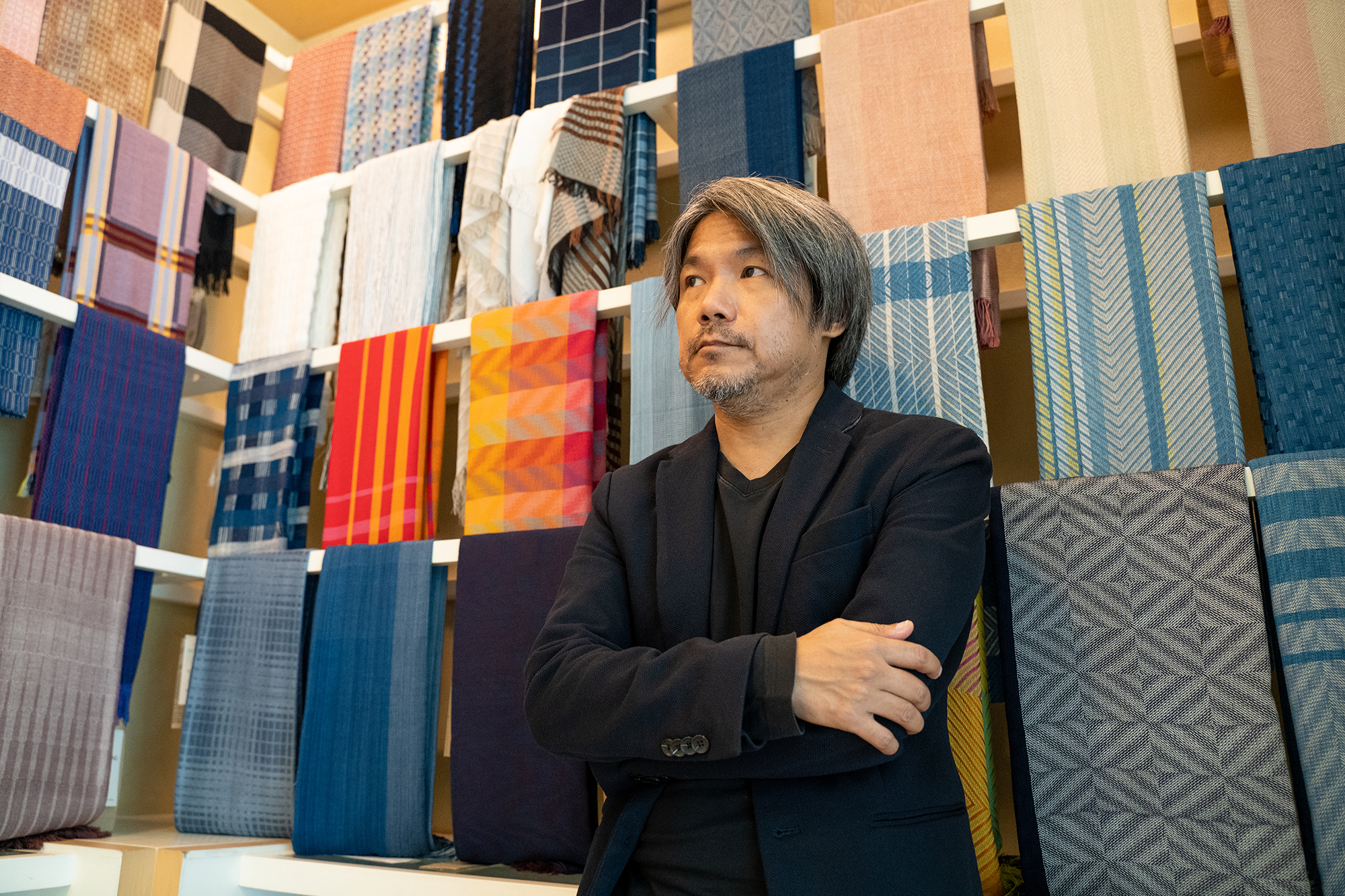
In line to hit the market soon is a collection of handwoven pleats. It has always been a given in the fashion industry that pleats can only be made with synthetic, not natural, fibres. Kris, however, begs to differ. “Thai handwoven textiles have always been considered an art form, and the idea of mixing synthetic yarns into the weave is almost sacrilegious. In the northeast, they would even light incense before weaving; it was almost ritualistic. But at the same time, was it possible to break the rules, get past old beliefs and blend synthetics into handwoven textiles?”
The pleating machine the foundation uses is far from high-tech. It’s the ‘simple engineering’ Kris previously referred to and it dates back to the 1980s. “I’m all for high-tech,” he says, “but we have to look at ourselves. We are an agrarian society and we shouldn’t attempt to chase technology. Our strengths are different.”
And don’t talk to Kris about inspiration; it’s impulse that drives him. He feels that age has an advantage in that you can look back and draw ideas from the past, based on actual experience. Sometimes it’s just a matter of taking a basic, everyday object like pha khao ma (all-purpose cloth) and giving it a new lease of life.
“I create pha khao ma from upcycled plastic, which is then designed into apparel and bags. It sounds so simple. But the next step is to close the loop and ensure that the pha khao ma itself can be recycled. Upcycling is good but it’s still linear—from plastic bottles to clothing items. It still ends up as waste in the end. How do you build a circular economy for fashion? What needs to happen next is that we have to be able to offer a trade-back system, we need to be able to collect all our products back and recycle them, rather than allowing them to become landfill.”
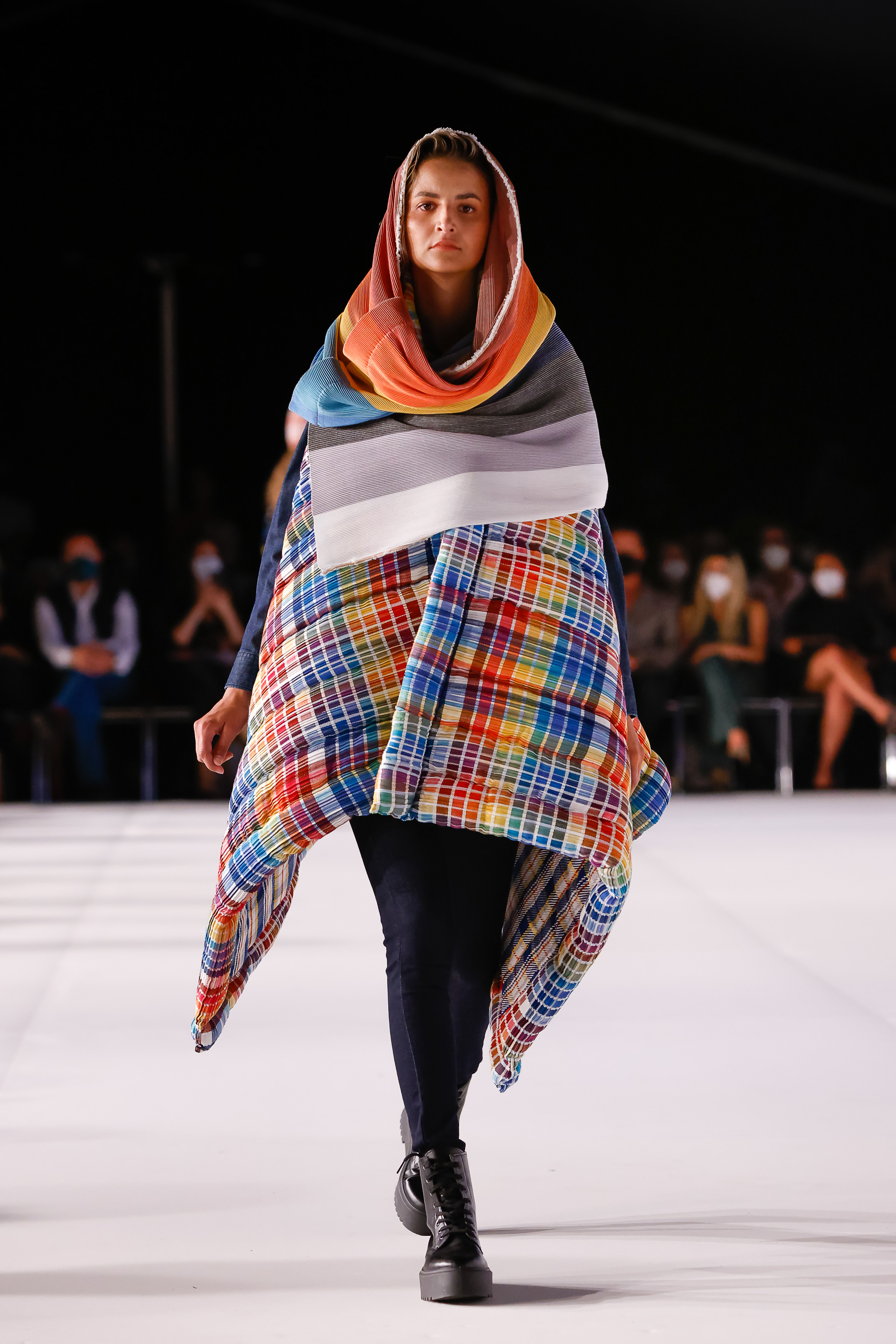
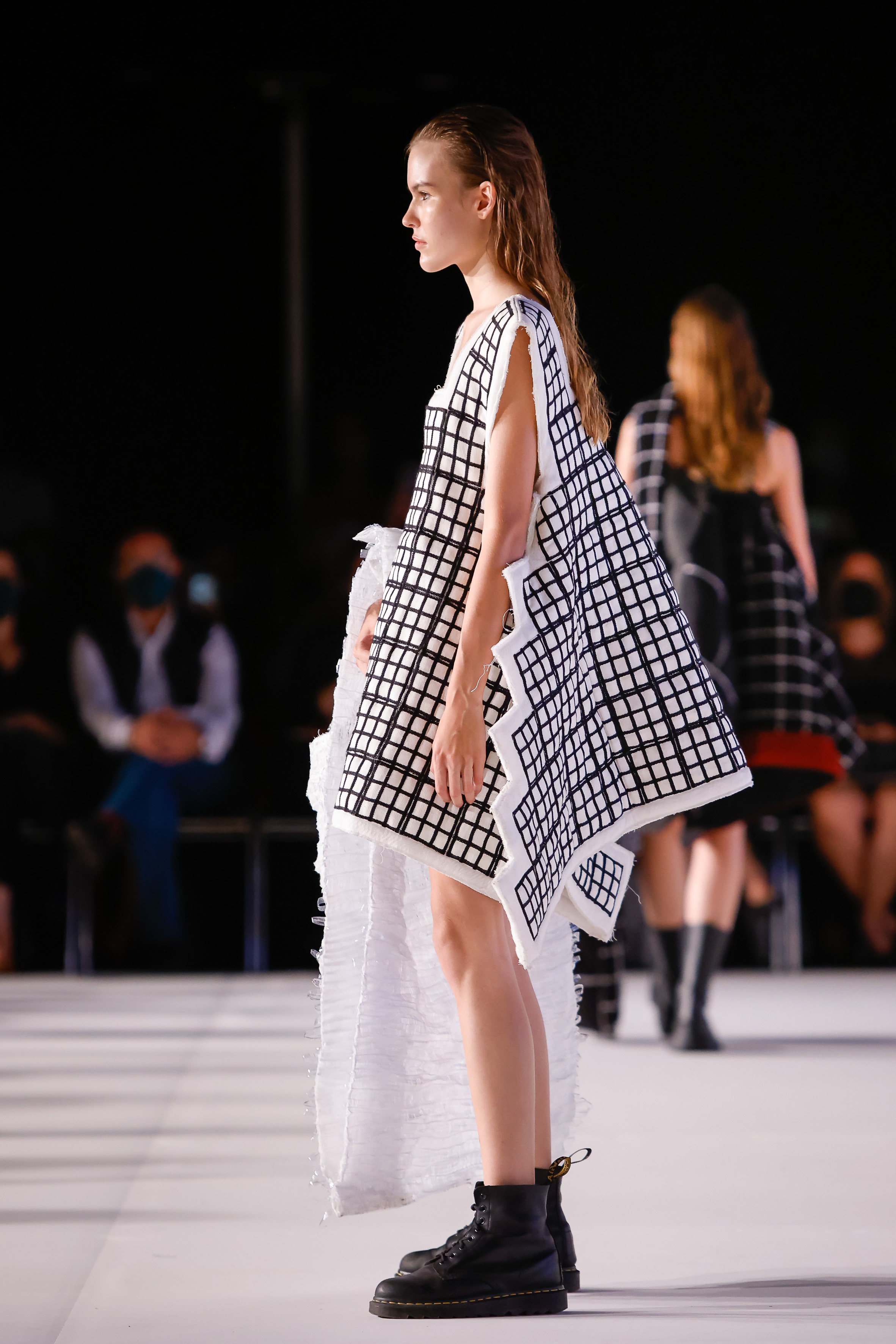
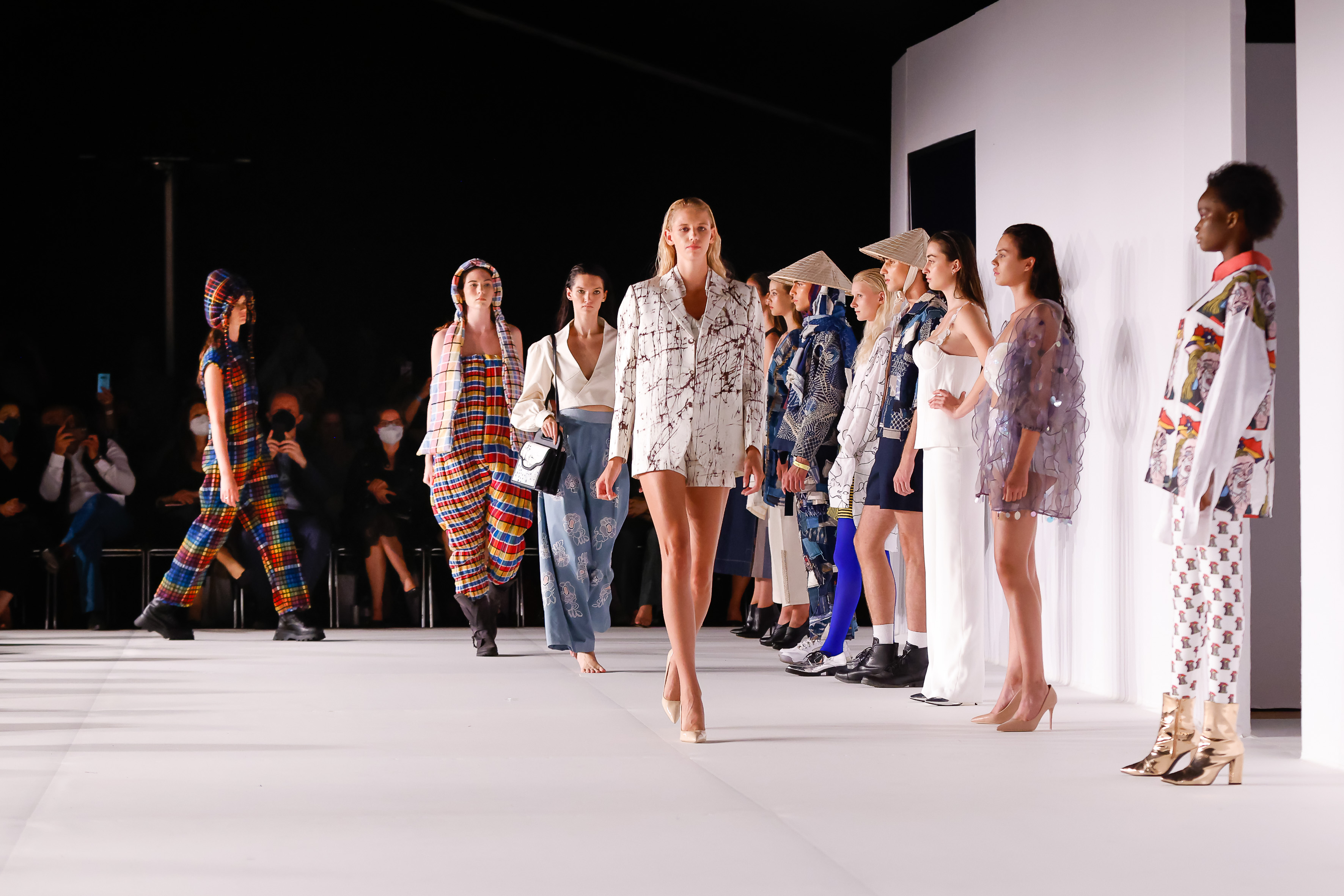
DoiTung’s pha khao ma collection at MQ Vienna Fashion Week
Hence innovation isn’t the only pillar of DoiTung products because sustainability also plays a major role for the Mae Fah Luang Foundation. Its Zero Waste to Landfill campaign, enforced for a number of years now, covers all aspects of operations, including ready-to-wear. The zero-waste pattern cutting method, which draws on traditional hill tribe techniques, is based on simplicity and a softer impact on nature, with each step of production designed to create as little waste as possible. Colour dyes are also selected to ensure minimal harm on the environment.
Today the brand’s reputation is assured. While Bangkok was still in lockdown, DoiTung’s latest collection was in the runway spotlight at MQ Vienna Fashion Week, showcasing a display of bold and colourful check patterns popularised by the pha khao ma.
In the meantime, Kris continues to fulfil a personal need to give and share—in contrast to his early years of self-indulgence. He does this through teaching (although time constraints limit it to PhD students) and his pride was recently manifested when two of his former students exhibited their work at MQ Vienna Fashion Week. In effect, his own loop is complete.
[This story first appeared in Koktail Magazine Issue 1.]
Courtesy of @sailorr Sailorr and Molly Santana’s black grills fuse hip-hop swagger ...
These top 5 barber shops in Bangkok are where gentlemen can elevate ...
Wandering around the globe, try out the signature tastes of cultures across ...
While traditional TV shows are serving us endless boy-meets-girl tales. Thailand has ...
Must-have gadgets for kids in the Y2K are, predictably, making a comeback ...
A collaboration you can’t miss if you love sportswear, Japanese culture and ...
Wee use cookies to deliver your best experience on our website. By using our website, you consent to our cookies in accordance with our cookies policy and privacy policy